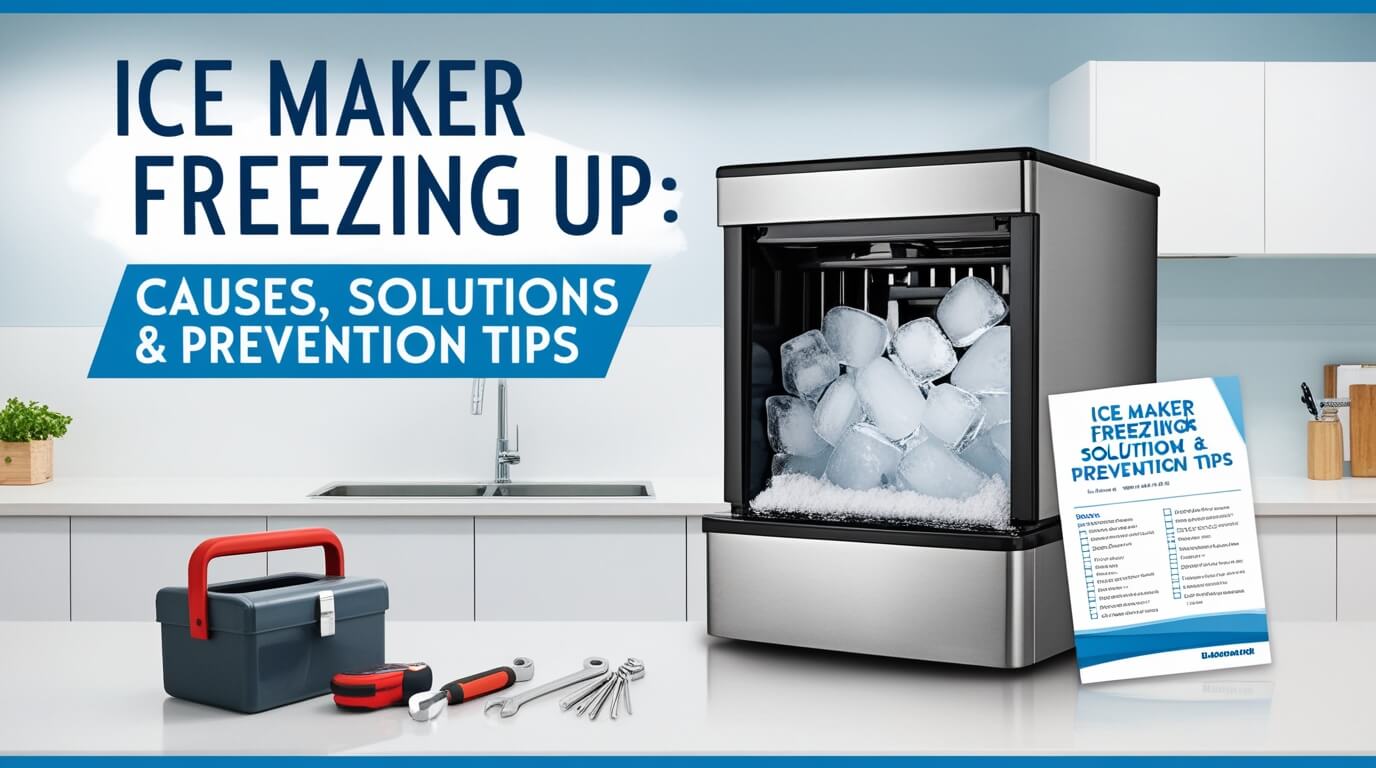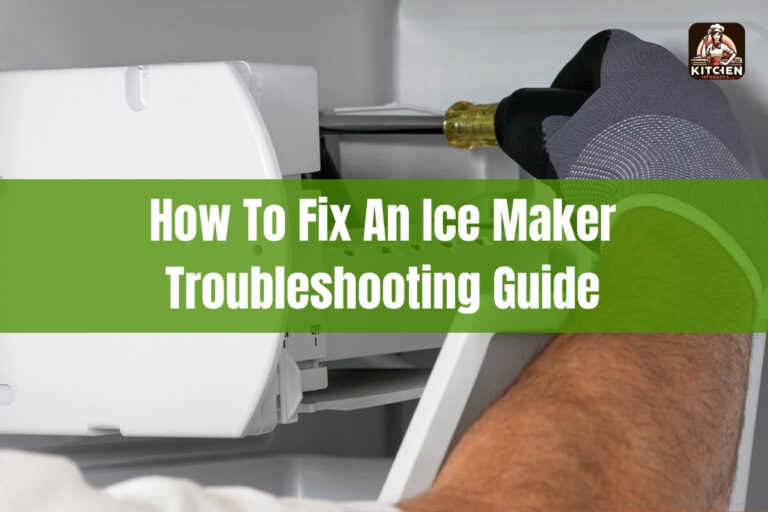
Is your ice maker giving you the cold shoulder? An ice maker freezing up can halt ice production, cause water leaks, and even damage your refrigerator. This comprehensive guide tackles everything you need to know about this chilly problem, from identifying the causes to implementing effective solutions and prevention strategies.
Ice Maker Freezing Problem
What does “ice maker freezing up” mean?
When an ice maker freezes up, ice forms where it shouldn’t – typically around the mechanism or in the water lines. This excess ice prevents normal operation, stopping ice production and potentially damaging components.
Common signs of a frozen ice maker
Watch for these red flags:
- No ice production
- Smaller or misshapen ice cubes
- Ice clumps in the bin
- Visible frost or ice buildup
- Water leaking from the refrigerator
Spotting these signs early can save you from bigger headaches down the line.
Main Causes of Ice Maker Freezing Issues
Clogged water lines and low water pressure
Like arteries in the human body, water lines can develop blockages. Mineral deposits, dirt, or even small ice chunks can restrict water flow. When water trickles in too slowly, it has more time to freeze before reaching the ice mold.
Faulty water inlet valves
The water inlet valve controls water flow into the ice maker. If it’s stuck open, too much water enters the system. Result? A frosty mess. Conversely, a valve that doesn’t open fully can cause low water pressure issues.
Incorrect freezer temperature settings
Your freezer’s thermostat plays a crucial role. Set it too cold, and you’re practically begging for a freeze-up. The sweet spot? Most manufacturers recommend around 0°F (-18°C) for optimal ice production.
Malfunctioning thermostats or sensors
Sometimes, it’s not the setting but the thermostat itself causing trouble. A faulty sensor might tell your freezer it’s warmer than it really is, leading to overcooling and ice buildup.
Scale buildup and mineral deposits
Hard water is the nemesis of ice makers. Over time, minerals can accumulate on components, interfering with moving parts and insulating sensors. This buildup can throw the whole system out of whack.
Troubleshooting a Frozen Ice Maker
Safety precautions before troubleshooting
Before you dive in, remember:
- Unplug the refrigerator or switch off the dedicated circuit breaker
- Wear gloves to protect your hands from sharp edges and cold surfaces
- Have towels handy to catch any water
Safety first, always!
Step-by-step guide to diagnose the problem
- Visual inspection: Look for obvious ice buildup or frost
- Check water supply: Ensure the water line isn’t kinked or frozen
- Examine the fill tube: Look for ice blockages
- Inspect the water inlet valve: Check for visible damage or mineral deposits
- Test the freezer temperature: Use a thermometer to verify the setting
When to call a professional
If you’re uncomfortable with any step or if the problem persists after trying DIY solutions, it’s time to call in the pros. Better safe than sorry when dealing with complex appliances.
DIY Solutions for a Frozen Ice Maker
Defrosting techniques (manual and automatic)
Manual defrosting:
- Turn off the ice maker
- Remove the ice bin
- Use a hair dryer on low heat to melt ice (keep it moving to avoid damage)
- Wipe away water with towels
Automatic defrosting: Some refrigerators have a forced defrost mode. Check your manual for instructions on activating this feature.
Cleaning and maintaining your ice maker
Regular cleaning prevents many freezing issues:
- Empty and wash the ice bin monthly
- Wipe down the ice maker mechanism with a soft cloth
- Use a mixture of warm water and vinegar to dissolve mineral deposits
- Run a cleaning cycle if your model has this feature
Adjusting freezer temperature settings
If your freezer’s too cold, try raising the temperature slightly. Aim for 0°F (-18°C) and adjust in small increments, allowing 24 hours between changes to see the effects.
Preventing Future Ice Maker Freeze-Ups
Regular maintenance tips
- Replace water filters as recommended (usually every 6 months)
- Inspect water lines for kinks or damage quarterly
- Clean the ice maker and bin monthly
- Check door seals for proper closure
Optimal freezer settings for ice production
While 0°F (-18°C) is a good starting point, your optimal temperature might vary slightly. Experiment within a degree or two to find the sweet spot for your specific model.
Importance of water quality and filtration
Hard water is tough on ice makers. Consider installing a water softener or using filtered water to reduce mineral buildup. At the very least, use and replace your refrigerator’s water filter regularly.
When to Replace Your Ice Maker
Signs that indicate replacement is necessary
- Frequent freeze-ups despite maintenance
- Visible cracks or damage to the ice maker unit
- Inconsistent ice production or quality
- Strange noises during operation
- Ice maker is more than 10 years old
Choosing a new ice maker: factors to consider
When shopping for a replacement:
- Compatibility with your refrigerator model
- Ice production capacity
- Type of ice produced (cubes, crushed, nuggets)
- Energy efficiency ratings
- Additional features (smart capabilities, self-cleaning)
Ice Maker Freezing in Different Refrigerator Brands
Common issues in popular brands
Samsung: Often experiences problems with the ice bucket not sitting properly Whirlpool: May have issues with the fill tube freezing GE: Sometimes suffers from faulty water inlet valves LG: Can have problems with ice clumping in the bin
Brand-specific troubleshooting tips
Samsung: Ensure the ice bucket is properly seated and the front of the bucket is not touching the auger Whirlpool: Check and potentially replace the fill tube heater GE: Inspect and clean the water inlet valve regularly LG: Use the ice bucket shake function (if available) to prevent clumping
Frequently Asked Questions About Frozen Ice Makers
How often should I clean my ice maker?
Clean your ice maker monthly for optimal performance. However, if you have hard water, you might need to clean it more frequently.
Can a frozen ice maker damage my refrigerator?
Yes, a persistently frozen ice maker can lead to water leaks, which may damage electrical components or cause mold growth if left unchecked.
Why does my ice maker freeze up in summer?
Surprisingly, ice makers can freeze up more in summer. Higher humidity can cause condensation, which then freezes. Additionally, opening the freezer door more often in hot weather can introduce warm, moist air, leading to frost buildup.
final thoughts
Ice maker freeze-ups are a common but preventable issue. By understanding the causes, implementing regular maintenance, and knowing when to call for professional help, you can ensure a steady supply of ice for those hot summer days or impromptu gatherings.
Remember, a little attention goes a long way in preventing your ice maker from giving you the cold shoulder. Keep it clean, maintain proper temperatures, and address issues promptly to enjoy hassle-free ice production year-round.
Now that you’re armed with this knowledge, you’re ready to tackle any ice maker freezing problems that come your way. Stay cool and keep those ice cubes flowing!






